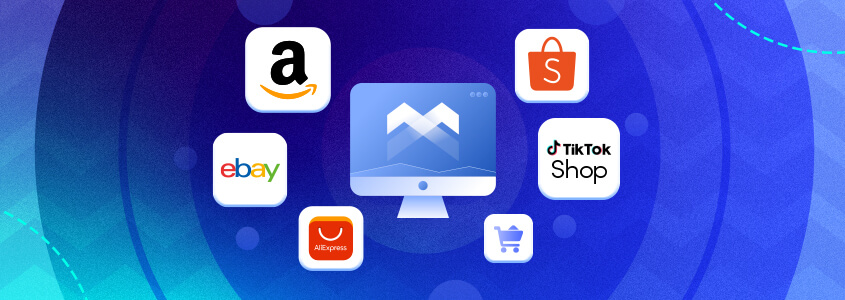
- Product

- Pricing
- Affiliate Program
- Use Cases
- Resource


E-Commerce has been experiencing tremendous growth as of late, and this trend is expected to continue in 2023 and beyond. While this growth presents many opportunities for merchants, it also brings new challenges, particularly when it comes to privacy and data security. Merchants need to ensure that they are taking steps to protect their customers' data and their own from cyber threats and other risks. As e-commerce continues to grow, merchants must stay vigilant and proactive in their efforts to safeguard their online businesses and maintain the trust of their customers. In this context, ensuring the privacy of user data and securing the information of merchants is of paramount importance.
According to eMarketer, global e-commerce sales are projected to reach $6.4 trillion by 2024, with Asia-Pacific being the largest market. Before we move on to the problem with this much volume of transactions and the need to secure users' data, let us explore some contemporary trends in E-commerce and dropshipping.
Mobile Commerce
Mobile commerce (or m-commerce) is expected to grow in popularity as more and more consumers use their smartphones to shop online. According to Statista, m-commerce sales are expected to reach $3.56 trillion by 2021.
Social Commerce
Social media channels, such as Instagram and FB, are becoming more popular as e-commerce channels. Brands are leveraging these platforms to reach and engage with their customers and sell products directly on these platforms.
Personalization
Personalization is becoming increasingly important in e-commerce, with more and more retailers using data to create personalized shopping experiences for their customers.
Voice Commerce
Voice-enabled assistants such as Amazon Alexa and Google Assistant are becoming more popular, and retailers are starting to integrate voice commerce capabilities into their e-commerce platforms.
Augmented Reality
Some retailers use augmented reality (AR) to provide customers with immersive shopping experiences. For example, customers can use their smartphones to see what a piece of furniture would look like in their home before making a purchase.
Overall, the e-commerce industry is set to continue and grow in 2023, driven by technological advancements and changing consumer behavior.
Anti-detect is a software or tool designed to help e-commerce and dropshipping businesses evade detection by fraud detection systems and other security measures. These tools mask the user's true identity, making it difficult for websites and other platforms to track their activity and behavior.
Anti-detect tools use various techniques to hide the user's IP address, browser fingerprints, and other identifying information. This can include using proxies and virtual private networks (VPNs) to mask the user's location and encrypt their traffic, as well as manipulating browser settings and other system configurations to make it appear as if the user is accessing the Internet from a different device or location.

Websites track many factors. Using cookies is one of the most popular techniques to acquire data. Cookies, in a nutshell, are small text files that a website places on your computer to help you have a better experience on the site.
Every time you visit a website, your browser loads cookies, which use entirely distinct kinds of files:
User preferences, such as display, language, region, etc.
Advertising (for example, to serve personalized advertisements)
Session State (information about how the interaction with the content occurs).
Security (used to prevent unauthorized access)
Preferences (which include the display of the interface, its appearance, and available functionality, as well as the region and language settings)
The website creates unique settings when you visit by examining the cookies on your machine. Also, cookies help us identify whether or not you are a returning visitor. You can create a user without cookies or use others with the anti-detect browser.
A person can also be located online using their IP address. It is a collection of numbers used to identify a device on the Internet. It can keep tabs on your accounts, your geolocation, and the websites you visit online. You can also alter this setting if you use an anti-detect browser with a proxy.
Anti-detect browsers are an effective instrument for e-commerce reputation management and sales promotion. But how can anti-detects manage to be so successful? Let's take a closer look at the guiding philosophy behind their work to comprehend this better.
Anti-detects are constructed using well-known browser engines. Undetectable, for instance, make use of the Chrome. They can be used to visit any website, just like Internet browsers. Anti-detect browsers exploit the digital fingerprint spoofing that each user leaves behind while using the Internet to do this.
Digital fingerprints enable specialist tools to recognize practically any user's digital identity. By segmenting users based on predetermined indicators, they allow websites and services to gather analytical information about the audience and deny access to the resource's functionality and content to users who do not fit the predetermined criteria.
Anonymous browsers for online shopping use elements like the type of the device and computing system, along with the digit capacity, time, and region of the user's device.
The string that the client program sends to the server's User-Agent parameters. It includes the user application's and browser's fundamental properties.
Anti-detects can alter and spoof digital prints, which enables marketplace anti-fraud systems and other platforms to identify you as a user who satisfies the required criteria.
You can utilize an infinite number of fingerprints with professional anti-detects. You can use Undetectable to manage as many accounts as possible on online stores and social media platforms. The defensive systems will simultaneously regard each of them as a natural account.
An anti-detect browser lets you run several ad campaigns, create various social and blog marketing accounts, and so on. on the same device without getting banned or limited.
But this is just the beginning!
Using an anti-detect browser comes with a plethora of other advantages. Find out how valuable they are to the operation of a firm by looking at the following:
It enables you to log into several accounts on the same site without putting any of your information at risk.
By integrating multiple commercial proxy servers, this service allows users to log in securely from any nation of their choosing.
It allows you to run advertisements from several accounts without risking being prohibited.
Ensures that each account is set up in its unique location, preventing any accounts from becoming connected.
Managing many social media accounts simultaneously and working together as a group is made possible, which increases productivity.
Provides anti-fingerprint capabilities that will fool Facebook and Google into thinking the site came from a different source, hence eliminating the possibility of being banned from using their services.
Because repetitive tasks can be automated with the appropriate tool, you can save time and money using that technology.

MoreLogin is a leading anti-detect browser that helps professionals and general users pursue their goals with ease, comfort, and, more importantly, security. It is a complete solution to people being wary of large e-commerce platforms, such as Alibaba and Amazon, as well as small, local stores. Wherever data comes into the picture, things get tricky. But, MoreLogin can help you conceal the digital fingerprint so that your actions become untraceable.
The process of getting onboard is simple. You must provide your email, set a password, and enter an invitation code. There, you are all set!
Another great thing about MoreLogin is its pricing. There is a free account, but it only supports two users and two profiles. This could be enough for many E-commerce shoppers, but digital marketing professionals need more. This is where base and custom packages come to the fore.
You can create multiple accounts through a single dashboard, enjoy the anonymity of browsing and shopping, and divide the workload among different individuals and teams.
So, what are you waiting for? Sign up today and streamline your workflow!